Esports goes from the bedroom to the world stage, as even the Olympics embraces one of world's the biggest, fast-growing entertainment industries.
2022 was a triumphant year in sports. From Katie Tayler’s bout against Amanda Serrano, Rachael Blackmore at Cheltenham, to Argentina’s suspenseful win at the FIFA World Cup, the list can go on indefinitely.
But one of last year’s most overlooked sporting events, which had 5.1 viewers tuning in, Super Bowl level musical acts, and a gripping final score – went largely unnoticed here; yes, it was an esport.
Watch the trailer for the documentary League of Legends Origins
The League of Legends World Finals took place in the Chase Center, San Francisco, last November. It was a best-of-five series between two teams, the underdogs DRX and the legendary T1, in a battle that can only be described as David-versus-Goliath.
In front of some 18,000 spectators and millions of viewers online, the culmination of one of the world's most-played games was, simply put - exceptional. You don’t need to know about esports, recognise the teams, or even understand a single thing about gaming to appreciate a stadium roaring in unison as DRX’s surprise win sinks in.
THE FINAL MOMENTS OF A LEGENDARY #WORLDS2022 FINAL. pic.twitter.com/Nz74JY6c8F
— LoL Esports (@lolesports) November 6, 2022
And yet, despite many countries investing seriously into their esports industries, and year on year, the sector becomes bigger and bolder, the very mention of an esports event in Ireland can still raise a curious eyebrow from people. Competitive gaming? As a career?
And yet, events like Worlds 2022 are commonplace across the wide spectrum of gaming. League of Legends is just one spoke in a much wider wheel, after all.
If there's even the slightest competitive element to a game, there’s an esports community developed around it. Shooters like Overwatch, Fortnite, and Valorant, to card games like Hearthstone and Magic the Gathering, to Formula 1, Gran Turismo, and Fifa, all have their own respected leagues, series, and rising stars. Many of their events eclipse the viewership and engagement of traditional sports with ease.
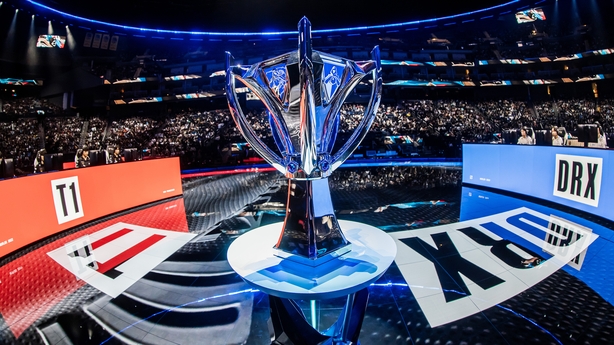
World Championship Finals in San Francisco. (Pic: Colin Young-Wolff/Riot Games)
And yet, the very idea of esports is not exactly that new. In 1972, Stanford students gathered to participate in the combat game Spacewar, an event largely recognised as one of the first instances of competitive gaming.
Throughout the golden age of arcades, people were constantly competing over high scores, a mechanic still relevant in today’s world of speed-running. Fighting games like Street Fighter and Mortal Kombat helped solidify the magic of in-person competition in the 90s, slowly evolving the scene into what we know today.
In just one or two decades, esports has gone from total obscurity and a hobbyist pastime to players earning six-figure deals and becoming revered worldwide. If you have a screen near you, you’re one click away from enjoying some form of esports entertainment.
Esports also finds itself at the intersection of other cultural sectors, with fashion, food, music, TV, and film all following in its shadows. Puma, Louis Vitton, and a host of other fashion labels have created various esports apparel. Anyone who has listened to Lil Nas X’s worldwide earworm Star Walkin’ on the radio probably never realized it was written as the anthem for Worlds 2022.
Watch: Lil Nas X performs Star Walkin' at the Worlds 2022 Finals
A recent announcement from the International Olympic Committee of an Esports series is further proof of its undeniable climb. Sports like Taekwondo, Tennis, Baseball, and Archery will be included in an esports series in Singapore this year. While many hoped more established video games would also be included, the recognition itself cannot go unnoticed.
Ireland's potential for esports
GamerFest is one of the leading gaming festivals in Ireland. Founded in 2017 by Stuart Dempsey, the event continues to go from strength to strength each year, a testament to the growing appetite for competitive gaming in Ireland.
"Back in 2017, I was in a full-time marketing role, but I saw the growth of gaming events internationally, and I felt there was an opportunity to do something similar here in Ireland. That was the start of GamerFest," Stuart says.
"We had very humble beginnings and put the event together on a shoestring, but the buzz and feedback from the gaming community was incredible, and so we developed and grew the event from there."
"Our most recent event, GamerFest Winter, welcomed 5,000 visitors to the RDS, supported by international game publishers like Warner Bros, SEGA, and Ubisoft, as well as leading consumer brands including eir and McDonalds."
Watch highlights from GamerFest 2023
The 2017 edition of GamerFest, Stuart says, was much more informal, with signups on the day and modest prizes. But since then, an "exponential growth" globally in esports has seen the tournament follow suit.
"At GamerFest Winter, we worked directly with the publisher Ubisoft to launch an Official Rainbow Six Siege tournament here in Ireland with a prize pool of €3,000, so our esports activities are now central to the overall festival," he says.
"Traditionally speaking, Ireland has lagged behind some other countries in terms of esports adoption, but that's changing quickly. The exposure esports received during the pandemic when traditional sporting events were on hold has really put it on the radar of many more stakeholders than was previously the case."
"We are seeing more and more interest from partners and sponsors, while recent multinational investment in Ireland by companies such as Riot Games is also incredibly important," he adds.
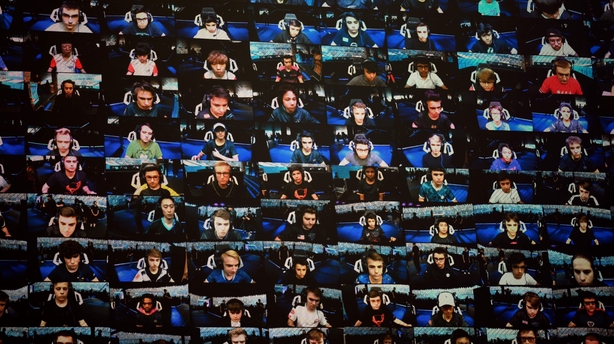
"Irish-based esports organisations, including Nativz Gaming, Wylde Esports, and Munster Rugby Gaming are now providing opportunities for Irish players to join those teams, which is fantastic to see."
"In education terms, there are some really welcome developments around esports, for example, the launch of the Esports Scholarship by South East Technical University. Equally, government and political stakeholders are becoming more aware of the economic benefits of esports to the economy, which is something that other European countries are already exploiting incredibly well."
"Having said that, there is much more to be done, particularly in terms of developing a coordinated strategy amongst all stakeholders to capitalise on the opportunities that esports can provide. With GamerFest continuing to grow, we plan to continue to shine a light on the incredible esports talent and opportunities here in Ireland."
Esports as a "major growth industry" in Ireland
MEP Maria Walsh has been a vocal supporter of the potential of the Irish esports and wider gaming industry to date. As the sole Irish member of the Culture & Education Committee, she has insight into upcoming policies, what other countries have been doing, and what Ireland’s next steps should be.
So what is it about esports that should interest Ireland?
"Global gaming revenue in 2021 was 170 billion. That is bigger than Hollywood, and the music industry combined," Maria says.
"Here in Ireland, we have an incredible international reputation for excellence in the arts, and we must continue to support the development of a vibrant media production and audiovisual sector in the State. It is my belief that the Esports and videogame sector has the potential to be a major growth industry in Ireland now and into the future."
The global gaming industry is worth billions, more than Hollywood and the music industry combined. Europe is well-placed to be an industry leader, with untapped creative potential.
— Maria Walsh MEP (@MariaWalshEU) November 10, 2022
🎙️ Here's my contribution in @Europarl_EN today. ⤵️ #gaming pic.twitter.com/eiI5bt2CkC
Of the two million gamers in Ireland, Maria says that an estimated 700,000 of these are esports enthusiasts, signalling a massive audience for the industry to grow from.
"Wider society has often perpetuated a stereotype of gaming as anti-social and very technical without recognising the massive social and creative impact it can have," she says.
"Esports, when engaged in moderation, can promote teamwork, communication skills and can provide really great career opportunities for young Irish people."
Maria also affirms that this isn’t just a male industry, either, as a report from the European Parliament identified that half of video game players are women and that girls who play games are three times more likely to engage in STEAM studies.
Developing an Irish Esports strategy
Regarding developing talent and supporting grassroots organisations, Maria admits that Ireland is "somewhat behind the curve" compared to other countries like Denmark, Germany, and the US. But this narrative is changing.
"Ireland has been making serious strides to change this in recent years. GamerFest, for instance, which is Ireland’s biggest Esports festival, has welcomed thousands of Irish and European visitors to its shows," she says.
Riot Games is set to create 120 jobs at its new Remote Broadcast Centre (RBC) in Swords in Dublin, which opens today.
— RTÉ News (@rtenews) July 20, 2022
Named 'Project Stryker', the centre is one of three planned facilities by the esports giant around the world. | More: https://t.co/1AYkLeoV7p pic.twitter.com/DwjukY7QvG
Recent investment from Riot Games in creating 120 jobs at their remote broadcast centre in Swords, and the establishment of Ireland Esports to promote gaming across the country, are two promising examples of growth in the sector. The digital Games tax credit is also something she notes as being very well-received in the industry and will go to great lengths to develop the Irish sector further.
So what could Ireland’s next move be? Like GamerFest’s Stuart Dempsey, Maria says an esports strategy is something to consider.
"In 2019, Denmark became the first country in the world to develop and launch an Esports strategy to provide assistance to the sector’s growth, development, and integration of the industry. I would love to see Ireland follow suit," she says.
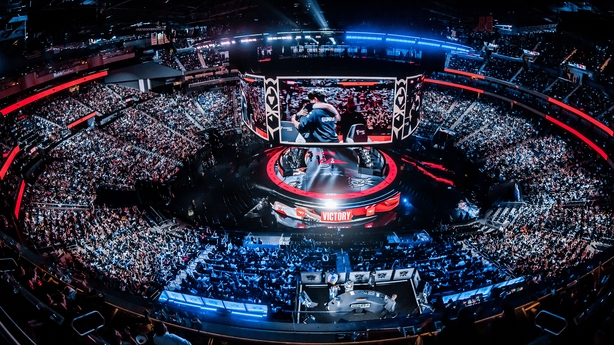
World Championship Finals in San Francisco. (Pic: Colin Young-Wolff/Riot Games)
"This would involve an interdepartmental task force examining how to promote growth conditions for Esports and reinforce Ireland’s ability to compete in attracting and developing major Esports events."
Back in October, the Culture & Education Committee unanimously approved a report on Esports and video gaming, and at the November plenary session, the EU Parliament adopted the report.
This report, Maria says, underlines the value of Esports and gaming, recommending a long-term strategy to support and fund the sector. Some of the key recommendations of the report she feels would be of interest to the Irish gaming and Esports sector are as follows:
Creating the European Video Game Observatory to provide decision-makers and stakeholders with harmonised data and recommendations to develop the sector.
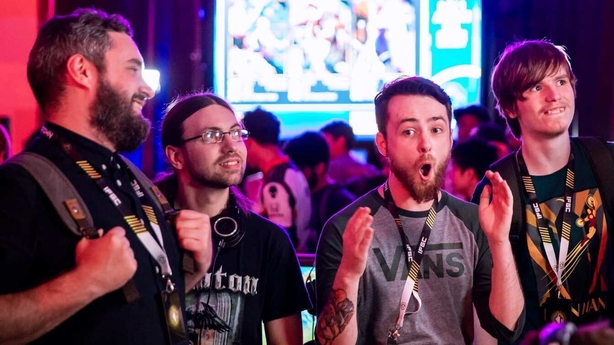
Use of video games and esports in schools, as means for developing digital literacy, soft skills, and creative thinking, in parallel with raising teachers’ awareness of this valuable teaching tool.
Addressing challenges in the sector, such as doping and match-fixing in professional gaming competitions and esports.
Increasing Creative Europe and Horizon Europe programming funds for the European video game sector.
"2023 is designated as the European Year of Skills," she says. "As a member of both the Culture & Education Committee and Employment Committee, I believe we can work through these Committees to find solutions to develop and retain European talents in the video gaming and Esports sector."
It’s time Ireland played
With every passing month, financial projections continue to ramp up the value of esports as a multibillion-dollar industry. And while many skeptics say that, at some point, the bubble will burst, esports continues to exceed the expectations set against it from the very beginning.
As it stands, Ireland is home to several major publishers like Riot Games, Electronic Arts, Blizzard Entertainment, and a slew of innovative, ambitious indie developers. We will surely attract even more innovation, attention, and investment with the games tax credit.
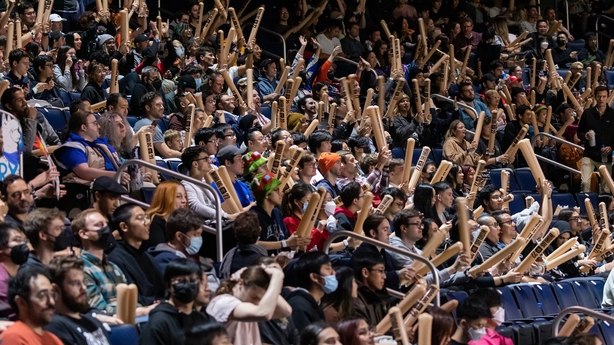
in San Francisco. (Photo by Marv Watson/Riot Games)
The opportunity to channel this momentum into Ireland’s esports scene should not be overlooked. We have the digital infrastructure and ambition. We have grassroots talent and passion. Instead of asking why surely the question should be, why not?
Why not aim to help develop future stars in the world’s biggest industry? Why not hold a future Worlds Final in Croke Park? Why not have the tri-colour fly high in Singapore later this year?


